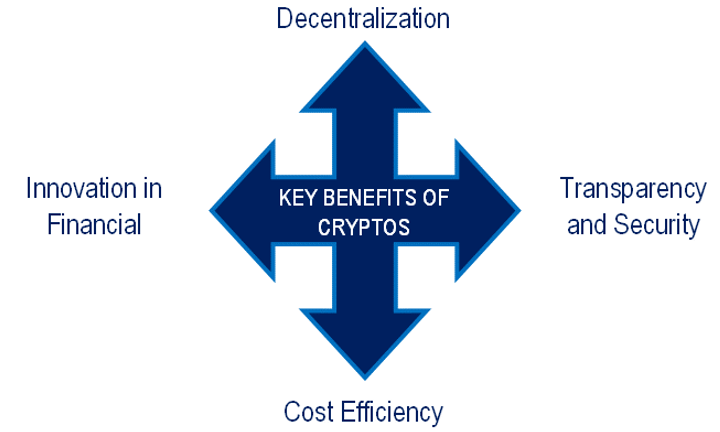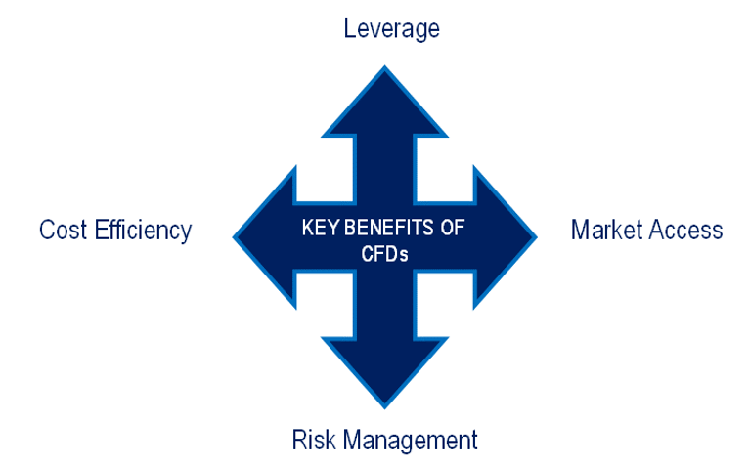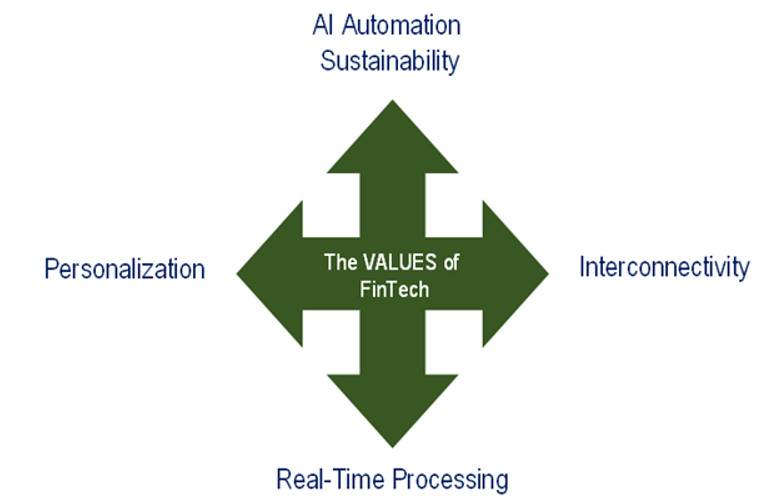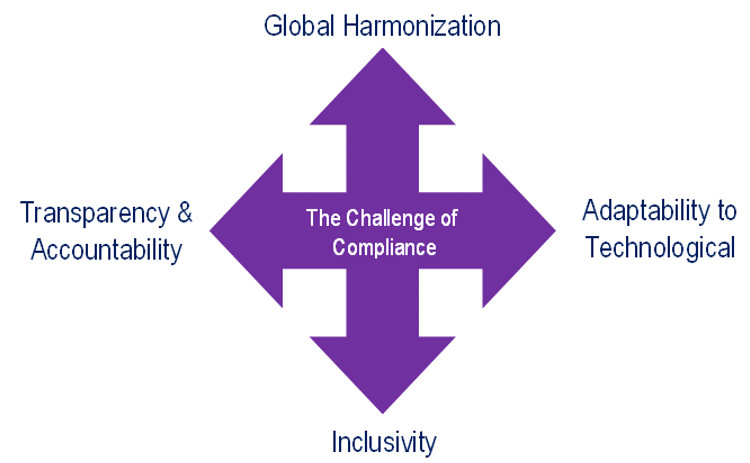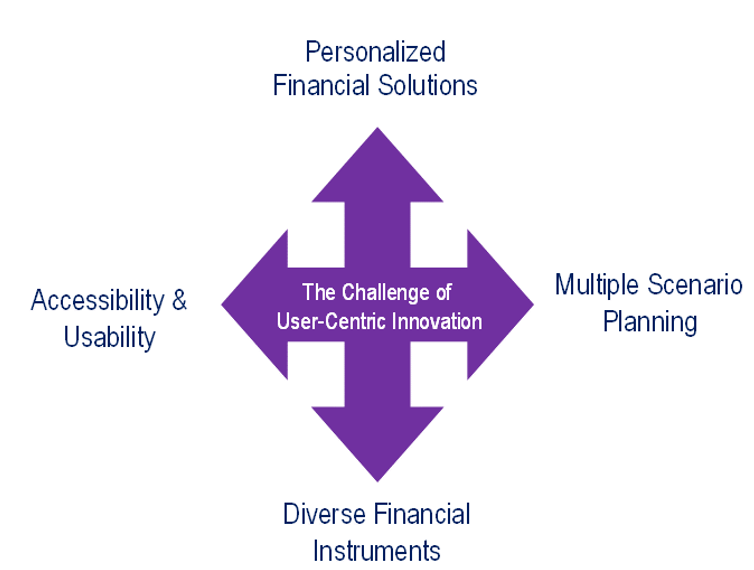The financial industry stands on the brink of a transformative era driven by Financial Technology (FinTech). As an integral part of the fourth industrial revolution, FinTech is reshaping how financial services are delivered, enhancing interconnectivity, and promoting efficiency.
The fourth industrial revolution, characterized by the fusion of physical, digital, and biological worlds, finds a robust ally in FinTech, which serves and is served by these advancements.
To understand this profound impact, we will explore the applications of cryptocurrencies and Contracts for Difference (CFDs), followed by a discussion of the significant challenges FinTech faces, particularly in compliance mechanisms and providing multiple options through advanced technologies.
FinTech in action - Cryptocurrencies and CFDs
1. Cryptocurrencies pioneering a new era of finance
Cryptocurrencies epitomize FinTech's innovative spirit by leveraging blockchain technology to facilitate decentralized, secure, and transparent financial transactions. Their key benefits include:
-
Decentralization: Operating without central authorities, cryptocurrencies democratize financial control, fostering greater financial inclusion.
-
Transparency and security: Blockchain technology ensures that transactions are transparent and immutable, significantly reducing fraud and enhancing trust.
-
Cost efficiency: By eliminating intermediaries, cryptocurrencies lower transaction costs and expedite cross-border payments, making financial services more accessible.
-
Innovation in financial products: Decentralized Finance (DeFi) platforms create new ecosystems for lending, borrowing, and trading, independent of traditional financial intermediaries, expanding the horizon of financial innovation.
2. Contracts for difference (CFDs) - Redefining trading flexibility
Contracts for Difference (CFDs) exemplify FinTech's capacity to provide flexible trading mechanisms, enabling investors to speculate on price movements without owning the underlying assets. Their benefits include:
Leverage: Offering enhanced market exposure with lower initial investments, CFDs can yield higher returns, though with increased risk.
-
Market Access: Investors can trade a wide range of markets, including equities, commodities, and cryptocurrencies, all from a single platform.
-
Cost Efficiency: CFD trading typically involves lower transaction costs compared to traditional trading methods, enhancing financial accessibility.
-
Risk Management: Tools like stop-loss orders enable investors to effectively manage their risks, navigating volatile markets with greater confidence.
Embracing the values of FinTech
FinTech embodies the core values integral to the fourth industrial revolution, driving innovation and fostering a more interconnected, automated, and personalized financial ecosystem. These values include:
-
Interconnectivity: FinTech enhances collaboration and efficiency by ensuring seamless information flow between systems. By integrating various financial services and platforms, FinTech creates a more cohesive and efficient financial ecosystem.
-
AI Automation: By utilizing AI and blockchain technologies, FinTech reduces human error, increases speed, and enhances accuracy. Automation streamlines processes, reduces costs, and improves service delivery, making financial services more reliable and accessible.
-
Real-time processing: FinTech platforms provide real-time data and analytics, enabling instantaneous decision-making and improving responsiveness to market changes. Real-time processing allows for more accurate and timely financial decisions, enhancing market efficiency.
-
Personalization: Leveraging big data and machine learning, FinTech offers personalized financial services tailored to individual needs and preferences. Personalization improves user experience, satisfaction, and engagement, leading to better financial outcomes.
-
Sustainability: By optimizing processes and reducing the need for physical infrastructure, FinTech promotes environmentally friendly practices, contributing to sustainability. Digital financial services reduce the carbon footprint associated with traditional banking operations, supporting global sustainability goals.
Key challenges in FinTech are about compliance and user-centric innovation
1. Compliance mechanisms should promoting global justice
One of the foremost challenges in FinTech is the development of compliance mechanisms by global authorities. These mechanisms must be crafted to promote fairness and justice, ensuring they are applicable universally. Key elements of this challenge include:
-
Global harmonization: Creating standardized regulations that apply across different jurisdictions to prevent regulatory arbitrage and ensure a level playing field.
-
Transparency and accountability: Implementing transparent compliance processes to build trust among consumers and stakeholders. This includes clear reporting standards and accountability measures for financial institutions.
-
Adaptability to technological advances: Regulations must be flexible enough to adapt to rapid technological changes while maintaining robust oversight.
-
Inclusivity: Ensuring that regulatory frameworks are inclusive, providing equal opportunities for small enterprises and startups, particularly in developing regions.
The goal is to strike a balance where regulations are stringent enough to protect the financial system and its users, yet flexible enough to foster innovation and growth within the FinTech sector.
2. User-centric innovation means empowering individual choices
The second, and perhaps most critical, challenge is placing the individual—whether a client, trader, or general user—at the center of FinTech innovations. This approach aims to empower individuals with the freedom to choose multiple paths to achieve their financial goals and ambitions. Key aspects include:
-
Personalized financial solutions: Leveraging artificial intelligence (AI) and other advanced technologies to offer personalized financial products and services that cater to individual needs and preferences.
-
Multiple scenario planning: Using AI to generate various financial scenarios and outcomes, helping users make informed decisions based on different potential futures.
-
Accessibility and usability: Ensuring that FinTech tools are user-friendly and accessible to a wide range of users, including those with limited technical skills or financial knowledge.
-
Diverse financial instruments: Providing a wide array of financial tools, from basic banking services to complex investment strategies, allowing users to select the best options that align with their goals.
By focusing on these elements, FinTech can enhance user empowerment, providing tools and technologies that offer multiple pathways to success.
Conclusion
FinTech, as a cornerstone of the fourth industrial revolution, is set to dominate the financial industry by promoting interconnectivity, automation, real-time processing, personalization, and sustainability. Addressing challenges such as compliance mechanisms and the provision of multiple options through advanced technologies is essential for its sustainable growth. By focusing on these areas, the FinTech industry can create a more inclusive, transparent, and efficient financial system, harnessing the full potential of technological advancements to drive innovation and meet the evolving needs of consumers and businesses worldwide. The journey ahead is filled with opportunities, and with the right strategies, FinTech can lead the way into a new era of financial empowerment and innovation.
CFDs are complex instruments and come with a high risk of losing money rapidly due to leverage. You should consider whether you understand how CFDs work and whether you can afford to take the high risk of losing your money. The Article/Information available on this website is for informational purposes only, you should not construe any such information or other material as investment advice or any other research recommendation. Nothing contained on this Article/ Information in this website constitutes a solicitation, recommendation, endorsement, or offer by LegacyFX and A.N. ALLNEW INVESTMENTS LIMITED in Cyprus or any affiliate Company, XE PRIME VENTURES LTD in Cayman Islands, AN All New Investments BY LLC in Belarus and AN All New Investments (VA) Ltd in Vanuatu to buy or sell any securities or other financial instruments in this or in in any other jurisdiction in which such solicitation or offer would be unlawful under the securities laws of such jurisdiction. LegacyFX and A.N. ALLNEW INVESTMENTS LIMITED in Cyprus or any affiliate Company, XE PRIME VENTURES LTD in Cayman Islands, AN All New Investments BY LLC in Belarus and AN All New Investments (VA) Ltd in Vanuatu are not liable for any possible claim for damages arising from any decision you make based on information or other Content made available to you through the website, but investors themselves assume the sole responsibility of evaluating the merits and risks associated with the use of any information or other Article/ Information on the website before making any decisions based on such information or other Article.
Editors’ Picks

GBP/USD struggles around 1.2600 after BoE rate decision
GBP/USD retreated from its daily peak and battles around 1.2600 following the Bank of England monetary policy decision. The BoE kept the benchmark interest rate unchanged at 4.75% as expected, but the accompanying statement leaned to dovish. Three out of nine MPC members opted for a cut.

EUR/USD retakes 1.0400 amid the post-Fed recovery
EUR/USD is recovering ground to near 1.0400 in the European session on Thursday. The pair corrects higher, reversing the hawkish Fed rate cut-led losses. Meanwhile, the US Dollar takes a breather ahead of US data releases.

Gold price recovers from one-month low, retains modest gains above $2,600
Gold price attracts some haven flows in the wake of the post-FOMC sell-off in the equity markets. The Fed’s hawkish outlook lifts US bond yields and provides near-term support to XAU/USD. Market players await US GDP and employment-related data.

Aave Price Forecast: Poised for double-digit correction as holders book profit
Aave (AAVE) price hovers around $343 on Thursday after correcting more than 6% this week. The recent downturn has led to $5.13 million in total liquidations, 84% of which were from long positions.

Fed-ECB: 2025, the great decoupling?
The year 2024 was marked by further progress in disinflation in both the United States and the Eurozone, sufficient to pave the way for rate cuts. The Fed and the ECB did not quite follow the same timetable and tempo, but by the end of the year, the cumulative size of their rate cuts is the same: 100 basis points.
RECOMMENDED LESSONS
Making money in forex is easy if you know how the bankers trade!
Discover how to make money in forex is easy if you know how the bankers trade!
5 Forex News Events You Need To Know
In the fast moving world of currency markets, it is extremely important for new traders to know the list of important forex news...
Top 10 Chart Patterns Every Trader Should Know
Chart patterns are one of the most effective trading tools for a trader. They are pure price-action, and form on the basis of underlying buying and...
7 Ways to Avoid Forex Scams
The forex industry is recently seeing more and more scams. Here are 7 ways to avoid losing your money in such scams: Forex scams are becoming frequent. Michael Greenberg reports on luxurious expenses, including a submarine bought from the money taken from forex traders. Here’s another report of a forex fraud. So, how can we avoid falling in such forex scams?
What Are the 10 Fatal Mistakes Traders Make
Trading is exciting. Trading is hard. Trading is extremely hard. Some say that it takes more than 10,000 hours to master. Others believe that trading is the way to quick riches. They might be both wrong. What is important to know that no matter how experienced you are, mistakes will be part of the trading process.

Best Forex Brokers with Low Spreads
VERIFIED Low spreads are crucial for reducing trading costs. Explore top Forex brokers offering competitive spreads and high leverage. Compare options for EUR/USD, GBP/USD, USD/JPY, and Gold.
